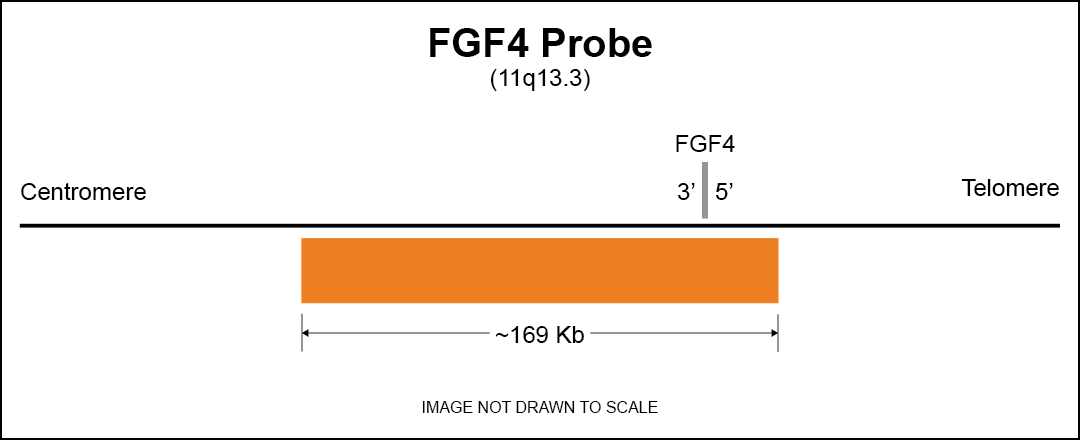FGF4 FISH Probe
The FGF4 FISH probe is designed to hybridize to the FGF4 gene and is primarily used for detecting amplifications and deletions associated with the gene. This probe is FISH confirmed on normal peripheral blood metaphase spreads and interphase nuclei. The probe can be labeled in one of five colors. Each probe is sold in a 20 test kit (approximately 20 slides - 22x22 mm area) and includes hybridization buffer. Please note that due to design optimizations, prices are subject to change.
** This product is for in vitro and research use only. This product is not intended for diagnostic use.
 .
.

| SKU | Test Kits | Buffer | Dye Color | Order Now |
|---|---|---|---|---|
| FGF4-20-OR (Standard Design) | 20 (40 μL) | 200 μL |  |
|
| FGF4-20-RE | 20 (40 μL) | 200 μL |  |
|
| FGF4-20-GO | 20 (40 μL) | 200 μL |  |
|
| FGF4-20-GR | 20 (40 μL) | 200 μL |  |
|
| FGF4-20-AQ | 20 (40 μL) | 200 μL |  |
|
| FGF4-20-DIG | 20 (40 μL) | 200 μL |  |
|
| FGF4-20-BIO | 20 (40 μL) | 200 μL |  |
Gene Summary
The protein encoded by this gene is a member of the fibroblast growth factor (FGF) family. FGF family members possess broad mitogenic and cell survival activities and are involved in a variety of biological processes including embryonic development, cell growth, morphogenesis, tissue repair, tumor growth and invasion. This gene was identified by its oncogenic transforming activity. This gene and FGF3, another oncogenic growth factor, are located closely on chromosome 11. Co-amplification of both genes was found in various kinds of human tumors. Studies on the mouse homolog suggested a function in bone morphogenesis and limb development through the sonic hedgehog (SHH) signaling pathway. [provided by RefSeq, Jul 2008]
Gene Details
Gene Symbol: FGF4
Gene Name: Fibroblast Growth Factor 4
Chromosome: CHR11: 69587796-69590171
Locus: 11q13.3
FISH Probe Protocols
| Protocol, Procedure, or Form Name | Last Modified | Download |
|---|
Poor prognostic impact of FGF4 amplification in patients with esophageal squamous cell carcinoma
Product Details
Product: FGF4 FISH Probe
Test Kits: 20 (40 μL)
ISH Buffer: 200 μL
SKU: FGF4-20-OR
Material Safety Data Sheet: MSDS.pdf
Turnaround Time: 7-10 Business Days
Shipping Time: 1-2 Day Expedited Shipping